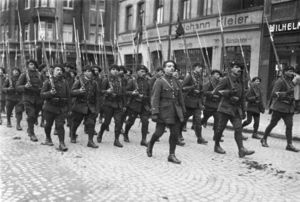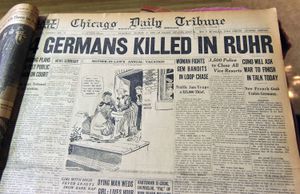احتلال الرور
| احتلال الرور | |||||||
|---|---|---|---|---|---|---|---|
| جزء من the Aftermath of World War I and Political violence in Germany (1918–33) | |||||||
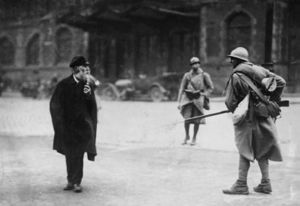 French soldiers and a German civilian in the Ruhr in 1923. | |||||||
| |||||||
| المتحاربون | |||||||
|
|
German protesters | ||||||
| القادة والزعماء | |||||||
|
|
| ||||||
| الضحايا والخسائر | |||||||
| 130 civilians killed | |||||||
احتلال الرور (ألمانية: Ruhrbesetzung) was a period of military occupation of the Ruhr region of Germany by France and Belgium between 11 January 1923 and 25 August 1925.
France and Belgium occupied the heavily industrialized Ruhr Valley in response to Germany defaulting on reparation payments dictated by the victorious powers after World War I in the Treaty of Versailles. Occupation of the Ruhr worsened the economic crisis in Germany,[1] and German civilians engaged in acts of passive resistance and civil disobedience, during which 130 were killed. France and Belgium, facing economic and international pressure, accepted the Dawes Plan to restructure Germany's payment of war reparations in 1924 and withdrew their troops from the Ruhr by August 1925.
The Occupation of the Ruhr contributed to German re-armament and the growth of radical right-wing movements in Germany.[1]
. . . . . . . . . . . . . . . . . . . . . . . . . . . . . . . . . . . . . . . . . . . . . . . . . . . . . . . . . . . . . . . . . . . . . . . . . . . . . . . . . . . . . . . . . . . . . . . . . . . . . . . . . . . . . . . . . . . . . . . . . . . . . . . . . . . . . . . . . . . . . . . . . . . . . . . . . . . . . . . . . . . . . . . .
الخلفية
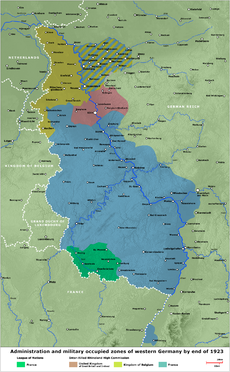
The Ruhr region had been occupied by Allied troops in the aftermath of the First World War. Under the terms of the Treaty of Versailles (1919), which formally ended the war with the Allies as the victors, Germany was forced to accept responsibility for the damages caused in the war and was obliged to pay war reparations to the various Allies. Since the war was fought predominately on French soil, these reparations were paid primarily to France. The total sum of reparations demanded from Germany—around 226 billion gold marks (US $834 billion in 2024)—was decided by an Inter-Allied Reparations Commission. In 1921, the amount was reduced to 132 billion (at that time, $31.4 billion (US $442 billion in 2024), or £6.6 billion (UK£284 billion in 2024)).[2] Even with the reduction, the debt was huge. As some of the payments were in raw materials, which were exported, German factories were unable to function, and the German economy suffered, further damaging the country's ability to pay.[3]
By late 1922, the German defaults on payments had grown so regular that a crisis engulfed the Reparations Commission; the French and Belgian delegates urged occupying the Ruhr as a way of forcing Germany to pay more, while the British delegate urged a lowering of the payments.[4] As a consequence of a German default on timber deliveries in December 1922, the Reparations Commission declared Germany in default, which led to the Franco-Belgian occupation of the Ruhr in January 1923.[5] Particularly galling to the French was that the timber quota the Germans defaulted on was based on an assessment of their capacity the Germans made themselves and subsequently lowered.[6] The Allies believed that the government of Chancellor Wilhelm Cuno had defaulted on the timber deliveries deliberately as a way of testing the will of the Allies to enforce the treaty.[6] The entire conflict was further exacerbated by a German default on coal deliveries in early January 1923, which was the thirty-fourth coal default in the previous thirty-six months.[7][8] Frustrated at Germany not paying reparations, Raymond Poincaré, the French Prime Minister, hoped for joint Anglo-French economic sanctions against Germany in 1922 and opposed military action. However, by December 1922 he saw coal for French steel production and payments in money as laid out in the Treaty of Versailles draining away.
الاحتلال
العصيان المدني والمقاومة السلبية من الشعب الألماني
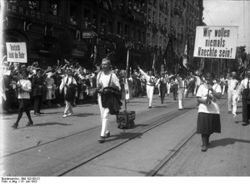
التعاطف مع ألمانيا
من المنظور الفرنسي
Despite his disagreements with Britain, Poincaré desired to preserve the Anglo-French entente and thus moderated his aims to a degree. His major goal was the winning of the extraction of reparations payments from Germany. His inflexible methods and authoritarian personality led to the failure of his diplomacy.[9]
التبعات
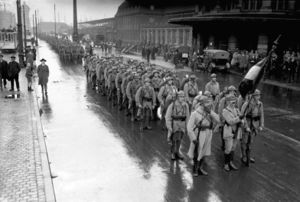
انظر أيضاً
- تاريخ الرور
- احتلال أرض الراين
- Remilitarization of the Rhineland
- International Authority for the Ruhr
الهامش
- ^ أ ب "Hyperinflation and the invasion of the Ruhr – The Holocaust Explained: Designed for schools". The Holocaust Explained. Retrieved 29 May 2020.
- ^ Timothy W. Guinnane (January 2004). "Vergangenheitsbewältigung: the 1953 London Debt Agreement" (PDF). Center Discussion Paper no. 880. Economic Growth Center, Yale University. Retrieved 6 December 2008.
- ^ The extent to which payment defaults were genuine or artificial is controversial, see World War I reparations.
- ^ Marks, pp. 239–240.
- ^ Marks, pp. 240–241.
- ^ أ ب Marks, p. 240.
- ^ Marks, p. 241.
- ^ Marks, p. 244.
- ^ Hines H. Hall, III, "Poincare and Interwar Foreign Policy: 'L'Oublie de la Diplomatie' in Anglo-French Relations, 1922–1924," Proceedings of the Western Society for French History (1982), Vol. 10, pp. 485–494.
المصادر
- Fischer, Conan. The Ruhr Crisis, 1923–1924 (Oxford U.P., 2003); online review
- Marks, Sally. "The Myths of Reparations," Central European History, Volume 11, Issue No. 3, September 1978 pp. 231–255.
- O'Riordan, Elspeth Y. "British Policy and the Ruhr Crisis 1922–24," Diplomacy & Statecraft (2004) 15 No. 2 pp. 221–251.
- O'Riordan, Elspeth Y. Britain and the Ruhr Crisis (London, 2001);
- Walsh, Ben. History in Focus: GCSE Modern World History;
الفرنسية والألمانية
- Stanislas Jeannesson, Poincaré, la France et la Ruhr 1922–1924. Histoire d'une occupation (Strasbourg, 1998);
- Michael Ruck, Die Freien Gewerkschaften im Ruhrkampf 1923 (Frankfurt am Main, 1886);
- Barbara Müller, Passiver Widerstand im Ruhrkampf. Eine Fallstudie zur gewaltlosen zwischenstaatlichen Konfliktaustragung und ihren Erfolgsbedingungen (Münster, 1995);
- Gerd Krüger, Das "Unternehmen Wesel" im Ruhrkampf von 1923. Rekonstruktion eines misslungenen Anschlags auf den Frieden, in Horst Schroeder, Gerd Krüger, Realschule und Ruhrkampf. Beiträge zur Stadtgeschichte des 19. und 20. Jahrhunderts (Wesel, 2002), pp. 90–150 (Studien und Quellen zur Geschichte von Wesel, 24) [esp. on the background of so-called 'active' resistance];
- Gerd Krumeich, Joachim Schröder (eds.), Der Schatten des Weltkriegs: Die Ruhrbesetzung 1923 (Essen, 2004) (Düsseldorfer Schriften zur Neueren Landesgeschichte und zur Geschichte Nordrhein-Westfalens, 69);
- Gerd Krüger, "Aktiver" und passiver Widerstand im Ruhrkampf 1923, in Günther Kronenbitter, Markus Pöhlmann, Dierk Walter (eds.), Besatzung. Funktion und Gestalt militärischer Fremdherrschaft von der Antike bis zum 20. Jahrhundert (Paderborn / Munich / Vienna / Zurich, 2006), pp. 119–30 (Krieg in der Geschichte, 28);
وصلات خارجية
- Occupation after the War (France and Belgium) at 1914-1918 Online: International Encyclopedia of the First World War.
- Ruhr Occupation at 1914-1918 Online: International Encyclopedia of the First World War.
- Short description is different from Wikidata
- Articles containing ألمانية-language text
- التاريخ الاقتصادي لفرنسا
- الجمهورية الفرنسية الثالثة
- 1924 في ألمانيا
- 1925 في ألمانيا
- 1923 في فرنسا
- 1924 في فرنسا
- 1925 في فرنسا
- التاريخ العسكري لبلجيكا
- احتلال أرض الراين
- الجيش الفرنسي
- تبعات الحرب العالمية الأولى في ألمانيا
- 1925 في العلاقات الدولية
- 1924 في العلاقات الدولية
- 1923 في العلاقات الدولية
- 20th century in North Rhine-Westphalia
- مقاطعة الراين
- مقاطعة وستفاليا

